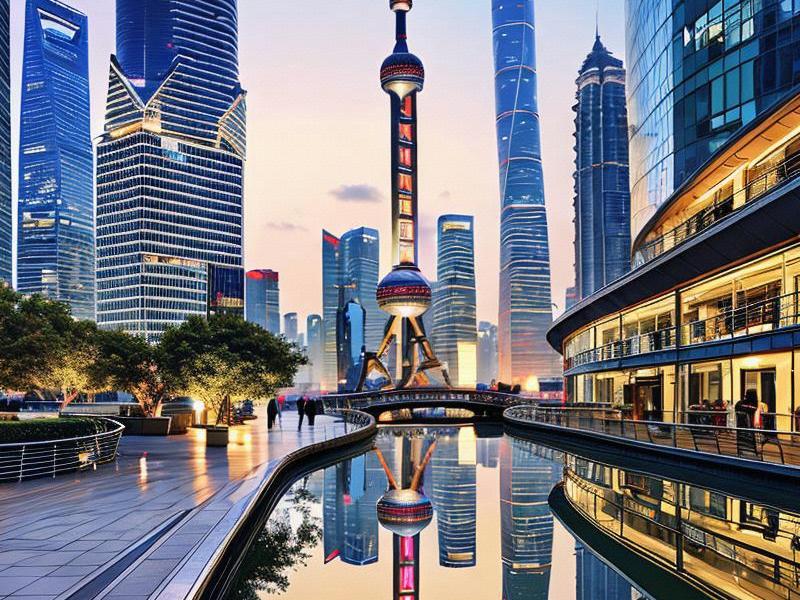
Shanghai, the largest city in China and one of the world's most dynamic urban centers, stands as a testament to the nation's rapid economic development and cultural evolution. Known as the "Pearl of the Orient," Shanghai is a city where the past and present coexist in a vibrant tapestry of innovation and tradition.
The city's transformation began in the 19th century when it was forcibly opened to foreign trade following the First Opium War. The establishment of the International Settlement and the French Concession brought an influx of Western influence, leading to the construction of iconic buildings such as the Bund and the former Racecourse. These structures, with their neoclassical and art deco styles, stand as a reminder of Shanghai's colonial past and its role as a gateway to the West.
However, Shanghai's story is not solely one of foreign influence. The city has a rich cultural heritage deeply rooted in Chinese traditions. The Yu Garden, a classical Chinese garden built in the Ming Dynasty, offers a serene escape from the bustling streets and showcases the intricate craftsmanship and aesthetic sensibilities of ancient China. The nearby Yuyuan Bazaar, with its traditional architecture and vibrant markets, provides a glimpse into the daily life and commerce that have flourished in Shanghai for centuries.
In the 20th century, Shanghai became a symbol of modernity and progress in China. The city was at the forefront of industrialization and urbanization, attracting migrants from all over the country seeking opportunities in its burgeoning economy. The rise of the Chinese Communist Party in 1949 marked a turning point, as Shanghai's role in the nation's political and economic landscape shifted. Despite periods of hardship, including the Cultural Revolution, Shanghai has consistently demonstrated its resilience and adaptability.
上海龙凤千花1314 Today, Shanghai is a global financial hub and a leader in innovation. The city's skyline is dominated by modern skyscrapers, including the iconic Oriental Pearl Tower and the Shanghai Tower, which is the tallest building in China and the second tallest in the world. These architectural marvels symbolize Shanghai's status as a global city and its commitment to technological advancement.
The financial district of Lujiazui is home to some of the world's largest banks and financial institutions, making it a critical player in the global economy. Shanghai's stock exchange is one of the busiest in Asia, reflecting the city's importance as a center for commerce and investment. The city's port, the world's busiest container port, underscores its role as a vital link in global trade networks.
Shanghai's commitment to innovation extends beyond finance. The city has become a hub for technology and entrepreneurship, with Zhangjiang Hi-Tech Park and other innovation districts fostering the growth of startups and research institutions. Shanghai is home to China's first science and technology innovation board, the STAR Market, which has attracted a wave of high-tech companies seeking to raise capital and expand their operations.
The city's cultural scene is equally vibrant, reflecting its diverse population and rich history. The Shanghai Museum, with its extensive collection of Chinese art, attracts millions of visitors each year. The city's theaters and concert halls host performances by both domestic and international artists, showcasing the breadth of its cultural offerings.
上海龙凤419官网 Shanghai's culinary scene is another highlight, blending traditional Chinese flavors with international cuisines. From the bustling night markets to the upscale restaurants in the French Concession, the city offers a gastronomic experience that reflects its cosmopolitan character. Peking duck, Xiaolongbao (soup dumplings), and Shaoxing wine are just a few of the local delicacies that visitors and residents alike enjoy.
The city's commitment to sustainability and green development is also noteworthy. Shanghai has implemented various initiatives to reduce pollution, improve public transportation, and promote energy efficiency. The Maglev train, which connects the city center to Pudong International Airport, is a testament to Shanghai's investment in advanced transportation technologies.
Shanghai's role in global cultural exchange is exemplified by its numerous international festivals and events. The Shanghai International Film Festival, one of the oldest and most prestigious film festivals in Asia, attracts filmmakers and audiences from around the world. The city's fashion weeks and art exhibitions showcase its position as a leader in creative industries.
爱上海同城对对碰交友论坛 Despite its rapid development, Shanghai remains committed to preserving its historical and cultural heritage. Efforts have been made to restore and protect historic buildings and neighborhoods, ensuring that future generations can appreciate the city's rich history. The preservation of the Former French Concession, with its tree-lined streets and colonial architecture, is a prime example of this commitment.
Shanghai's story is one of contrasts and coexistence—of ancient temples and modern skyscrapers, of traditional markets and high-tech innovation hubs, of colonial history and Chinese resilience. It is a city that has embraced change while honoring its roots, a city that continues to inspire and captivate the world with its unique blend of tradition and modernity.
As Shanghai looks to the future, it faces challenges and opportunities alike. The city must balance its rapid urbanization with environmental sustainability, ensure equitable access to its prosperity, and navigate the complexities of global geopolitics. At the same time, Shanghai has the potential to set a global example in urban planning, technological innovation, and cultural exchange.
In conclusion, Shanghai is a city of contrasts that embodies the spirit of China's transformation. It is a place where the past and present meet, where tradition and innovation coexist, and where the aspirations of a nation are reflected in the dreams of its people. Shanghai's journey is a story of resilience, adaptability, and a relentless pursuit of progress, making it a beacon of hope and opportunity in an ever-changing world.
